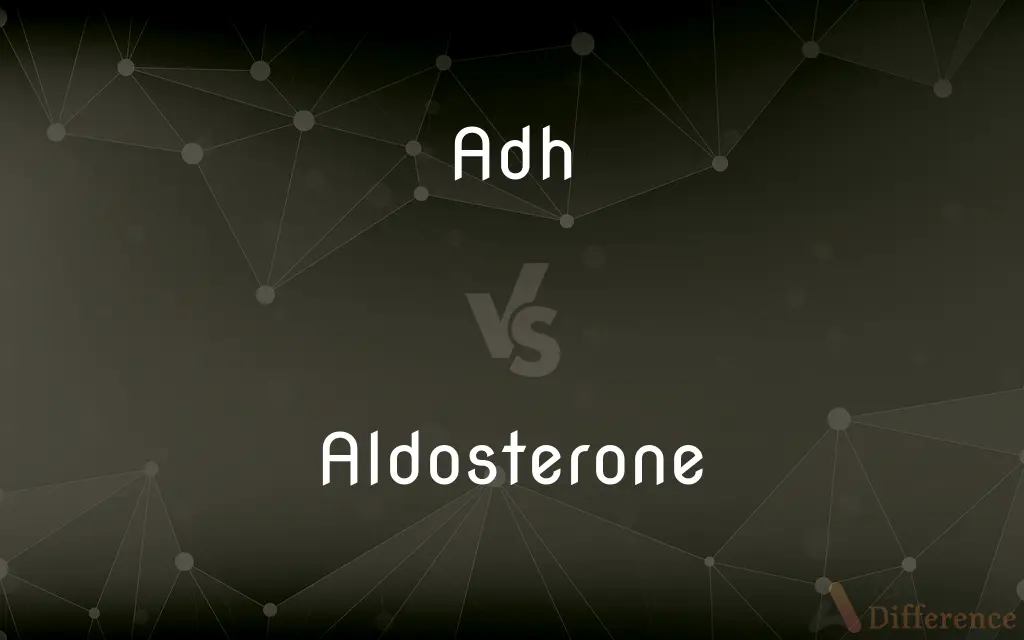ADH vs. Aldosterone — What's the Difference?
By Tayyaba Rehman — Updated on September 22, 2023
ADH and Aldosterone are hormones regulating fluid balance. ADH, primarily from the brain, focuses on water reabsorption in kidneys. Aldosterone, from adrenal glands, regulates sodium and potassium balance.

Difference Between ADH and Aldosterone
Table of Contents
ADVERTISEMENT
Key Differences
ADH, also known as vasopressin, originates from the hypothalamus and is stored in the pituitary gland. Aldosterone, on the other hand, is produced in the adrenal cortex, which is a part of the adrenal glands located above the kidneys.
Both ADH and Aldosterone play essential roles in maintaining bodily fluid balance. While ADH primarily acts on the collecting ducts of the kidneys to promote water reabsorption, Aldosterone mainly acts on the renal tubules to stimulate sodium reabsorption and potassium excretion.
Though ADH and Aldosterone function in the same organ - the kidney - their triggers and mechanisms differ. ADH is generally released in response to an increase in blood osmolarity or a decrease in blood volume. In contrast, Aldosterone's secretion is primarily stimulated by a decrease in blood sodium concentration or blood pressure.
ADH's primary function is to conserve body water by reducing the amount lost in urine. Aldosterone, however, works to maintain electrolyte balance, especially concerning sodium and potassium, which in turn helps maintain appropriate fluid levels and blood pressure.
While ADH and Aldosterone have distinct roles and mechanisms of action, they collaboratively ensure that our bodies maintain homeostasis, especially concerning fluid and electrolyte balance. It's the intricate interplay between these hormones that supports proper bodily functions.
ADVERTISEMENT
Comparison Chart
Origin
Hypothalamus (stored in pituitary gland)
Adrenal cortex
Primary Function
Promotes water reabsorption in kidneys
Stimulates sodium reabsorption and potassium excretion in kidneys
Trigger
Increase in blood osmolarity or decrease in blood volume
Decrease in blood sodium concentration or blood pressure
Acts on
Collecting ducts of kidneys
Renal tubules
Role
Conserve body water
Maintain electrolyte balance
Compare with Definitions
Adh
A hormone that regulates water reabsorption in kidneys.
Dehydration can stimulate the release of ADH to conserve water.
Aldosterone
A hormone that regulates sodium and potassium in the blood.
When sodium levels are low, Aldosterone release can help retain it in the body.
Adh
Produced in the hypothalamus and stored in the pituitary gland.
ADH release from the pituitary gland is a crucial response to decreased blood volume.
Aldosterone
Essential for maintaining blood pressure and fluid status.
Without adequate Aldosterone, the body might not retain enough sodium, leading to a drop in blood pressure.
Adh
Also known as vasopressin, it plays a key role in maintaining blood osmolarity.
When blood becomes too concentrated, ADH is released to help dilute it.
Aldosterone
It primarily acts on the kidneys to maintain electrolyte equilibrium.
Aldosterone helps in reabsorbing sodium while excreting potassium.
Adh
A hormone that responds to changes in blood concentration and volume.
Drinking a lot of water can decrease ADH secretion, leading to increased urine production.
Aldosterone
A key player in the renin-angiotensin-aldosterone system (RAAS).
In the RAAS, Aldosterone works to correct low blood pressure or volume.
Adh
Essential for fluid homeostasis within the body.
ADH levels can rise when the body senses a need to conserve water.
Aldosterone
Produced by the adrenal cortex and vital for fluid balance.
A drop in blood pressure can stimulate the secretion of Aldosterone.
Adh
Hormone secreted by the posterior pituitary gland (trade name Pitressin) and also by nerve endings in the hypothalamus; affects blood pressure by stimulating capillary muscles and reduces urine flow by affecting reabsorption of water by kidney tubules
Aldosterone
Aldosterone is the main mineralocorticoid steroid hormone produced by the zona glomerulosa of the adrenal cortex in the adrenal gland. It is essential for sodium conservation in the kidney, salivary glands, sweat glands, and colon.
Aldosterone
A steroid hormone that is produced by the adrenal cortex and regulates salt balance, blood volume, and blood pressure in the body.
Aldosterone
(steroid hormone) A mineralocorticoid hormone, secreted by the adrenal cortex, that regulates the balance of sodium and potassium in the body.
Aldosterone
A corticosteroid hormone that is secreted by the cortex of the adrenal gland; regulates salt (sodium and potassium) and water balance
Common Curiosities
What is the primary function of Aldosterone?
Aldosterone regulates sodium and potassium balance in the blood.
How do ADH and Aldosterone help in dehydration?
ADH promotes water retention, while Aldosterone helps retain sodium and excrete potassium.
How is Aldosterone related to blood pressure?
Aldosterone helps maintain blood pressure by regulating sodium and potassium levels.
Does ADH affect urine concentration?
Yes, ADH increases water reabsorption, leading to more concentrated urine.
Where is ADH produced?
ADH is produced in the hypothalamus and stored in the pituitary gland.
What triggers ADH release?
An increase in blood osmolarity or a decrease in blood volume triggers ADH release.
What system is Aldosterone a part of?
Aldosterone is part of the renin-angiotensin-aldosterone system (RAAS).
Where is Aldosterone produced?
Aldosterone is produced in the adrenal cortex.
How is alcohol consumption related to ADH?
Alcohol can inhibit ADH secretion, leading to increased urine production.
How does Aldosterone affect potassium?
Aldosterone promotes the excretion of potassium from the body.
Which hormone is also known as vasopressin?
ADH is also known as vasopressin.
Does Aldosterone play a role in salt cravings?
Yes, low Aldosterone levels can lead to sodium loss and might result in salt cravings.
Which hormone directly affects the collecting ducts in kidneys?
ADH directly affects the collecting ducts in kidneys.
What might decrease ADH production?
High water intake or decreased blood osmolarity can reduce ADH production.
Are ADH and Aldosterone related to edema?
Yes, imbalances in ADH or Aldosterone levels can affect fluid balance and potentially contribute to edema.
Share Your Discovery

Previous Comparison
Etiology vs. Pathology
Next Comparison
Demoralising vs. DiscouragingAuthor Spotlight
Written by
Tayyaba RehmanTayyaba Rehman is a distinguished writer, currently serving as a primary contributor to askdifference.com. As a researcher in semantics and etymology, Tayyaba's passion for the complexity of languages and their distinctions has found a perfect home on the platform. Tayyaba delves into the intricacies of language, distinguishing between commonly confused words and phrases, thereby providing clarity for readers worldwide.














































